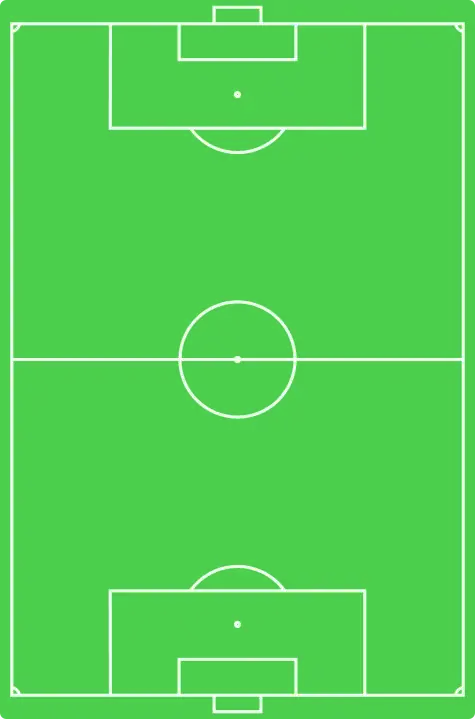Serbia national football team
The Serbia national football team (Serbian: Фудбалска репрезентација Србије, romanized: Fudbalska reprezentacija Srbije) represents Serbia in men's international football competition. It is controlled by the Football Association of Serbia, the governing body for football in Serbia.
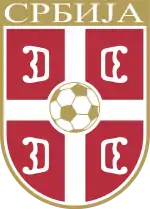 | |||
| Nickname(s) | Орлови / Оrlovi (The Eagles) | ||
|---|---|---|---|
| Association | Football Association of Serbia | ||
| Confederation | UEFA (Europe) | ||
| Head coach | TBA | ||
| Captain | Aleksandar Kolarov | ||
| Most caps | Branislav Ivanović (105) | ||
| Top scorer | Stjepan Bobek (38) | ||
| Home stadium | Rajko Mitić Stadium, Belgrade | ||
| FIFA code | SRB | ||
| |||
| FIFA ranking | |||
| Current | 30 | ||
| Highest | 6 (December 1998) | ||
| Lowest | 101 (December 1994) | ||
| First international | |||
(Antwerp, Belgium; 28 August 1920) as Serbia (Uherské Hradiště, Czech Republic; 18 August 2006) | |||
| Biggest win | |||
(Curitiba, Brazil; 14 June 1972) as Serbia (Baku, Azerbaijan; 17 October 2007) (Belgrade, Serbia; 19 November 2008) (Belgrade, Serbia; 10 October 2009) (Novi Sad, Serbia; 11 September 2012) (Belgrade, Serbia; 18 November 2020) | |||
| Biggest defeat | |||
(Antwerp, Belgium; 28 August 1920) (Paris, France; 26 May 1924) (Prague, Czechoslovakia; 28 October 1925) as Serbia (Lviv, Ukraine 7 June 2019) | |||
| World Cup | |||
| Appearances | 12 (first in 1930) | ||
| Best result | Fourth place within Yugoslavia (1930, 1962):Group stage as Serbia (2010),(2018) | ||
| European Championship | |||
| Appearances | 55 (first in 1960) | ||
| Best result | Runners-up within Yugoslavia (1960, 1968) | ||
With the national team nicknamed the Orlovi (Орлови; the Eagles), football has a long history in Serbia. Serbia competed under the various forms of Yugoslav national teams where it achieved considerable success, playing the final at the 1960 and 1968 European Championships and finishing fourth at the 1930 and 1962 World Cups. Considered by FIFA and UEFA to be the successor of both the Yugoslavia and Serbia and Montenegro national teams,[2][3][4] the achievements of the promising team of the 1990s (which featured Serbian players such as Dragan Stojković, Savo Milosevic, Predrag Mijatović, Vladimir Jugović and Siniša Mihajlović) was somewhat curbed due to international sanctions imposed against Yugoslavia at the time due to the Yugoslav Wars.
Following the dissolution of Serbia and Montenegro, Serbia has played as an independent nation since 2006, and qualified for the World Cup in 2010 and 2018. At Both World Cup's Serbia were eliminated at the group stage , but did record their most memorable occasion at the 2010 World Cup, beating bitter rivals Germany 1-0 , with Milan Jovanović scoring the winning goal.
Serbia usually use the home of Red Star Belgrade, the Rajko Mitić Stadium, as their home ground. Occasionally, the Partizan Stadium is also used.
History
1992–2002: Competing within FR Yugoslavia
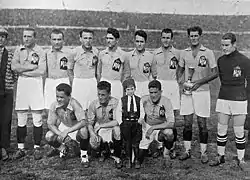
The Football Federation of what was then the Kingdom of Serbs, Croats and Slovenes was founded in Zagreb in 1919 under the name Jugoslavenski nogometni savez (and admitted into FIFA), and the national team played its first international game at the Summer Olympics in Antwerp in 1920. The opponent was Czechoslovakia, and the historic starting eleven that represented Kingdom of SCS on its debut were: Dragutin Vrđuka, Vjekoslav Župančić, Jaroslav Šifer, Stanko Tavčar, Slavin Cindrić, Rudolf Rupec, Dragutin Vragović, and Jovan Ružić. They lost by a large margin, 0–7,[5] but nonetheless entered their names in the history books.
The federation and football overall was disrupted by World War II. After the war, a socialist federation was formed and the football federation reconstituted. From 1945 to early 2003, the national team competed as Yugoslavia, although SFR Yugoslavia broke up in 1991.
Although the Federal Republic of Yugoslavia, consisting of Serbia and Montenegro, was formed on 27 April 1992, its teams were banned from all international sporting events, including the national football team. Consequently, the national team did not play its first game as a new country before 23 December 1994, a friendly match played in Porto Alegre and in which Brazil won 2–0. This was the first ever team composed of Serbian and Montenegrin players exclusively, while Slobodan Santrač, a former Yugoslavia national team player, was named the team's first ever manager. The next game was played three days later, this time in Buenos Aires, resulting in a 1–0 loss to Argentina.
Due to international sanctions against Yugoslavia, the team could not participate in 1994 World Cup qualifying nor the Euro 1996 qualifying process.
1998 World Cup
As FR Yugoslavia joined FIFA and UEFA in late 1994, the team was available to participate in the 1998 World Cup qualifiers. Slobodan Santrač was appointed as a coach for the team. In the qualifiers, Yugoslavia was drawn in Group 6 with Euro 1996 runners-up Czech Republic, Slovakia, Spain, Faroe Islands and Malta. With seven winning games (of which are both against the Czech Republic, Faroe Islands and Malta and one against Slovakia), two draw games (against Spain and Slovakia) and one lost game against Spain, Yugoslavia ended up in second place with 23 points behind Spain. Yugoslavia qualified for the play-off in which they were drawn to play against Hungary. With the aggregate score of 12–1 against Hungary, Yugoslavia qualified for the World Cup.
The 1998 World Cup seeding had Yugoslavia ranked 21st among the world's national teams, but Yugoslavia was widely recognized as one of the shadow favorites for the World Cup. The New York Times suggested that Yugoslavia could easily be a semi-finalist in that year's World Cup.[6] The draw put the team in Group F alongside Germany, the United States, and Iran. Yugoslavia won its first game 1–0 against Iran thanks to a goal from defender Siniša Mihajlović. The next game was a draw for Yugoslavia. After leading Germany 2–0, Mihajlović scored an own goal following a German freekick, and Oliver Bierhoff equalised at 2–2 with only about ten minutes to the match. Nonetheless, Yugoslavia responded in the next game against the United States and won 1–0 due to an early goal in Nantes. Yugoslavia finished second in the group and Germany won the group with a better goal difference.
Due to their second position, Yugoslavia saw itself face the Netherlands in the Round of 16. Yugoslavia entered in the match with a sole attacker, but its defensive tactics proved unsuccessful as Dennis Bergkamp put the Netherlands in front in the 38th minute. Immediately following the start of the second half, Yugoslavia pressured the Dutch, who conceded a header from Slobodan Komljenović. However, the turning point of this match was a penalty awarded to Yugoslavia after Vladimir Jugović was fouled in the penalty area. Predrag Mijatović missed, and the scoreline remained the same at 1–1. Such an event demoralized the Yugoslavs, as the Dutch took the initiative. In the late seconds of the game Edgar Davids' shot towards the Yugoslav net from a distance of 20 meters and beat goalkeeper Ivica Kralj. This marked the end of Yugoslavia's run in the 1998 World Cup.
Euro 2000
The draw for the Euro 2000 qualifiers saw first-seeded Yugoslavia drawn in a group with Croatia, thus marking the first games between the two teams after the breakup of Yugoslavia. The other teams in the group were the Republic of Ireland, Macedonia, and Malta. When the qualifiers began, the coach was Milan Živadinović, but in July 1999 he resigned and was replaced by Vujadin Boškov.
The team started with a 1–0 win over Ireland in Belgrade, before beating Malta 3–0 in Ta' Qali. The home fixture against the Maltese followed, but was moved to Thessaloniki, Greece due to the NATO bombing of Yugoslavia. The team nonetheless won 4–1. The first match against Croatia took place in Belgrade shortly after the bombing ended, and was interrupted due to a power outage at the beginning of the second half, resuming after 43 minutes[7] and eventually finishing 0–0. A 2–1 defeat against Ireland in Dublin was followed by victories home and away against Macedonia (3–1 and 4–2 respectively), meaning that Yugoslavia needed to win its final qualifier against Croatia in Zagreb, or to draw with Ireland failing to beat Macedonia in Skopje, in order to qualify automatically for Euro 2000. In the event, Ireland conceded an injury-time equaliser, meaning that Yugoslavia's 2–2 draw with the Croatians was good enough.
The draw for the finals placed Yugoslavia in Group C along with Spain, Norway and another former Yugoslav republic, Slovenia. The Slovenians took a 3–0 lead in the first game at the Stade du Pays de Charleroi, but three goals in six second-half minutes enabled Yugoslavia to secure a 3–3 draw. The team then beat Norway 1–0 in Liège, thanks to an early Savo Milošević backheel strike. The final group game, against Spain in Bruges, saw the Yugoslavs take the lead three times, before a Gaizka Mendieta penalty and an Alfonso strike in injury-time secured a dramatic 4–3 win for the Spaniards and top spot in the group. Yugoslavia nonetheless finished second, level on points with Norway but ranked ahead due to its victory in Liège. In each of the three games, the team had one player sent off (Siniša Mihajlović, Mateja Kežman, and Slaviša Jokanović, respectively).
In the quarter-finals, Yugoslavia was once again paired with the Netherlands. Unlike the last time, the co-hosts won 6–1 in Rotterdam with Patrick Kluivert scoring a hat-trick. Despite Yugoslavia's elimination, Savo Milošević was crowned the joint top scorer of the tournament alongside Patrick Kluivert. Both players scored five goals, although Milošević played one game fewer.[8]
2002 World Cup campaign
Ilija Petković was appointed as a coach for the team. For the 2002 World Cup qualifiers, Yugoslavia was drawn in Group 1 with Russia, Slovenia, Switzerland, the Faroe Islands and Luxembourg. Not long after winning against Luxembourg, Petković was sacked and replaced with three pieced team which consisted of Vujadin Boškov, Dejan Savićević and Ivan Ćurković. Despite being one of the favourites from the group and winning both games against Luxembourg and Faroe Islands as well and away game against Switzerland, Yugoslavia managed to suffer a home loss and away draw against Russia, a home draw against Switzerland and both draw games against Slovenia. Yugoslavia ended the qualifying campaign in the third place of the group just one point behind second-placed Slovenia.
Euro 2004 campaign
After failing to qualify for the 2002 World Cup, Savićević was appointed as a coach. After Savićević's spell as coach of Yugoslavia, the country went under a political transformation, and Ilija Petković became the newly named Serbia and Montenegro's new coach. For the Euro 2004 qualifiers Serbia and Montenegro was drawn in Group 9 with Italy, Wales, Finland and Azerbaijan. Despite drawing both games against group favourites and eventual group winners Italy and winning both games against runners-up Wales, Serbia and Montenegro failed to qualify, mostly due to a 2–2 home draw and 2–1 away loss to Azerbaijan, as well and 3–0 away loss to Finland.
2006 World Cup
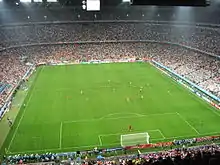
Petković remained as a coach for the team, despite the failure to qualify for Euro 2004. However, qualifying for 2006 World Cup was different. With six wins and four draw games, Serbia and Montenegro ended up first in the group with an undefeated record in their qualification group ahead of favourites Spain. The Serbia and Montenegro team also allowed only one goal in the ten matches, the best defensive record of all 51 teams participating in qualification.
For the 2006 qualifiers, Serbia and Montenegro was drawn in a group with Spain, Belgium, Bosnia and Herzegovina, Lithuania and San Marino. Led once again by Ilija Petković as the coach, Serbia and Montenegro with the "Famous Four" defence, consisting of Nemanja Vidić, Mladen Krstajić, Goran Gavrančić, and Ivica Dragutinović, with Dragoslav Jevrić as the goalkeeper, conceded only one goal in ten games, finishing first with a 6–4–0 record, ahead of Spain.
On 3 June 2006, following a referendum, Montenegro declared its independence from Serbia. As the World Cup was about to start, it was decided that the Serbia and Montenegro team that had qualified for the tournament would compete, with the split into separate teams representing the new countries of Montenegro and Serbia to take place once the team was no longer in the tournament.
In the group stage, Serbia and Montenegro lost their opening game to joint group favourite, the Netherlands. The final score was 1–0 after Arjen Robben scored the only goal of the game. They also lost their second game to Argentina 6–0, Serbia and Montenegro's worst ever international result. With the team's two losses and with Netherlands and Argentina winning both their games, Serbia and Montenegro could no longer qualify for the knockout matches and was playing for pride alone in their final group game against Ivory Coast. Despite having a 2–0 lead for much of the first half, the Elephants managed to come back and win 3–2, leaving Serbia and Montenegro with no points.
Euro 2008 campaign
After Montenegro declared independence, Serbia marked their split from Montenegro with a 3–1 win over the Czech Republic. For the Euro 2008 qualifiers, Serbia was drawn in Group A along with Poland, Portugal, Belgium, Finland, Kazakhstan, Armenia and Azerbaijan. The qualification process began promising and ended in disappointment for Serbia. A strong start in qualification was overshadowed by the final hurdle of matches where inconsistency took over, the side dropping points against the likes of Finland, Belgium, Armenia and Kazakhstan. They eventually finished third, three points behind runners-up Portugal and Group A winners Poland. Serbia's first-ever foreign coach Javier Clemente was sacked after the failure.
Serbia replaced Clemente with Miroslav Đukić, who then left the position on 19 August of the following year without having played any official games, due to various disagreements with the Football Association of Serbia.
2010 World Cup
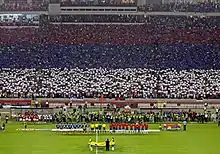
| Serbia's starting XI under coach Radomir Antić in their 1–0 win over Germany at the 2010 FIFA World Cup.[9] |
Subsequent to Ðukić's rapid departure, Radomir Antić was appointed coach and success followed. Serbia's World Cup qualification campaign began in 2008. Their qualification group featured 1998 World Cup winners and 2006 World Cup runners-up France, Romania, as well as Austria, Lithuania and the Faroe Islands. Serbia played consistently during the qualifiers and this led to the team automatically qualifying for the 2010 FIFA World Cup in South Africa. They confirmed qualification with a 5–0 win at home against Romania.
Like in 2006, Serbia went into the World Cup as the dark horses of the tournament. Key points justifying their potential surprise team status included a star-studded defence that was composed by Nemanja Vidić, Neven Subotić, Aleksandar Kolarov and Branislav Ivanović. The captain of Serbia's 2010 World Cup campaign was Dejan Stanković, who became the only player to feature in a World Cup having played under three different national names (although he never changed nationality; this was a result of geopolitical events involving the identity of Yugoslavia).[10] In their first tournament as an independent nation, they were to face Ghana, Germany and Australia.
Their opening group game was against Ghana and chances came to both sides but a red card to Aleksandar Luković and a handball by substitute Zdravko Kuzmanović in the second half gave Ghana a penalty to take all three points at the death. Asamoah Gyan converted eight minutes from full-time and Serbia were defeated 1–0.
In Serbia's second group match, they defeated Germany by a score of 1–0 with a goal by Milan Jovanović late in the first half. FIFA's official YouTube channel called the win "the most famous day in Serbia's footballing history".[11]
Serbia only needed a single point to reach the knockout stages but was defeated by Australia 2–1. Australia scored two goals in the second half through Tim Cahill and Brett Holman. A late Marko Pantelić goal served only as a consolation. They finished last in the group.
Radomir Antić was sacked two games into the Euro 2012 qualification process, a 1–1 draw at home to Slovenia spelling the end to his two-year stint. The sacking meant the bringing in of Vladimir Petrović to the job.
Euro 2012 campaign
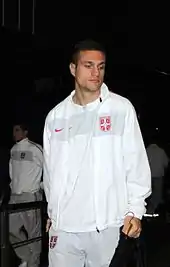
Serbia once again failed to qualify for the European Championships, making it 12 years since the country last took part in the tournament. Serbia was drawn in Group C featuring Italy, Slovenia, Estonia, Northern Ireland and the Faroe Islands. The qualifying stage began with Radomir Antić as coach and finished with Vladimir Petrović. Serbia and Antić started the first two games positively with a 3–0 win away to Faroe Islands and a 1–1 draw at home to Slovenia but this result brought the end of Antić's reign as the country's coach. New coach Petrović faced setbacks immediately with a 3–1 loss at home to Estonia and an abandoned match resulting in a 3–0 loss to Italy due to crowd trouble from the Serbian away supporters in Genoa.
Serbia returned to form with a 2–1 win at home over Northern Ireland but could only manage a 1–1 draw away to Estonia.
Afterwards, Serbia won back to back games with a 1–0 win away to Northern Ireland and a crucial 3–1 win at home against Faroe Islands. These results put Serbia in pole position to confirm a play-off spot behind Italy.
Serbia needed a win at home against Italy to confirm a play-off spot but their efforts only resulted in a 1–1 draw. The team, however, still had one more chance to confirm a play-off place when they faced Slovenia away. This game was a must-win even though Serbia had a superior goal difference over Estonia, a draw was not good enough for progression. Serbia played positively and created a number of chances during the game but a long-range goal put Slovenia up 1–0 at half time. The Serbians then failed to convert numerous chances that they had in the second half, notably Nemanja Vidić's penalty miss midway through the second half. Serbia left empty-handed after a 1–0 loss and exited the tournament for the third time in a row during the qualifying group stages, missing out by one point behind Estonia.
2014 World Cup campaign
Vladimir Petrović was sacked after the team's failure to qualify. Ahead of the qualifying campaign for the 2014 FIFA World Cup, Dejan Stanković and Nemanja Vidić announced that they were retiring from international football. This meant that Serbia had lost two key players and that a new era had started. Branislav Ivanović became the new captain. Siniša Mihajlović, a former member of the national team, was appointed as the coach on 24 April 2012. Serbia was drawn in Group A in qualification for 2014 FIFA World Cup, together with Croatia, Belgium, Scotland, Macedonia, and Wales. The team began the qualification campaign with a goalless draw with Scotland and a 6–1 win over Wales. In the next two games, Serbia suffered two defeats, from Macedonia and Belgium.
On 22 March 2013, Serbia played in Zagreb against Croatia. The game was highly anticipated in both countries due to their rivalry both on and off the pitch. Croatia won 2–0. Serbia then defeated Scotland 2–0 at home in a crucial qualifier, though their World Cup hopes were taken away after a 2–1 defeat to Belgium. Serbia drew with Croatia 1–1 in the corresponding fixture at home, where 18-year-old Aleksandar Mitrović scored an equalizer in the second-half after Mario Mandžukić opened the scoring. They then defeated Wales 0–3 in Cardiff. Dejan Stanković's farewell game was completed in a friendly against Japan, which Serbia won 2–0. He finished his career with 103 appearances for the national team, a record previously held by Savo Milošević, with 102 appearances. Serbia finished qualifying with a 5–1 home win against Macedonia, putting them in third in the group, three points from a playoff spot behind Croatia and group winners Belgium.
Euro 2016 campaign
After failing to qualify for the 2014 World Cup, Dick Advocaat was appointed as the coach in 2014. Serbia was drawn in Group I in qualification for UEFA Euro 2016, together with Portugal, Denmark, Albania and Armenia. Advocaat started with a draw in a friendly 1–1 game against France. The team began qualification with a 1–1 draw against Armenia. In the next, abandoned game against Albania in Belgrade, Serbia was originally awarded with a 3–0 victory, but was later deducted three points. On 14 November 2014, Serbia played against Denmark in Belgrade and lost, 1–3. After this game, Advocaat left, whereupon Radovan Ćurčić was announced as a new coach on 18 November.
In 2015, Serbia's first match was a qualifying match against Portugal in Lisbon, during which Serbia lost 2–1, cutting their chances for qualification to Euro 2016. On 13 June 2015, Serbia played a qualifying match against Denmark in Copenhagen, losing 2–0. On 10 July, the Court of Arbitration for Sport (CAS) announced that it had awarded a 0–3 victory to Albania in the abandoned match held on 14 October 2014, upholding Serbia's three-point penalization. As a result, Serbia became mathematically eliminated from Euro 2016 qualification. On 4 September 2015, Serbia made first victory in this qualification 2–0, against Armenia. On 8 October 2015, Serbia defeated Albania with a goal each from Aleksandar Kolarov and Adem Ljajić. In the table of Group I, Serbia finished second to last place with four points in a five team group.
2018 World Cup
.jpg.webp)
After failing to qualify for Euro 2016, Slavoljub Muslin was appointed as a coach. Serbia was drawn with Euro 2016 semi-finalists Wales, Austria, Ireland, Georgia and Moldova. They started off their campaign with a 2–2 draw against Ireland at the Red Star Stadium and continued this good form with wins over Austria, Georgia and Moldova.
Serbia beat Moldova in Belgrade with goals from Aleksandar Kolarov, Aleksandar Mitrović and Mijat Gaćinović. This consolidated their first position going into their top-of-the group clash with Ireland. They won this match with a 55th-minute goal from Kolarov. Serbia finished the qualifying campaign with a 1–0 home win against Georgia, and ended at the top of Group D and therefore qualified for the 2018 tournament, its first major tournament after an eight-year absence. Despite Serbia's qualification, Muslin was sacked by the Football Association of Serbia for not inviting Sergej Milinković-Savić to play in the campaign. This decision sparked a lot of controversy in the Serbian public. Mladen Krstajić took the place as a temporary coach after Muslin's dismissal and led the team in the World Cup.
In the World Cup, Serbia opened their match against Costa Rica. Kolarov's free kick at the second half meant Serbia won their first World Cup game after eight years. Serbia lost their later encounters, losing 1–2 to Switzerland with a 90-minute goal scored by Xherdan Shaqiri and 0–2 to Brazil, thus once again eliminated from the group stage of a big tournament.
2018–19 Nations League
Due to poor performance of Serbia in previous years, the country found itself started the campaign of the 2018–19 UEFA Nations League C, where they were drawn into Group 4 with Montenegro, Lithuania and Romania. With both wins against Lithuania and Montenegro and both draw games against Romania, Serbia finished on top of the group, securing the Euro 2020 play-off spot and being promoted into League B for 2020–21 season. With six goals, Aleksandar Mitrović finished the tournament as the top scorer.
Euro 2020 campaign
After the 2018 World Cup, Mladen Krstajić became a permanent coach for Serbia. Serbia started the campaign of 2018–19 UEFA Nations League, which served as a part of UEFA Euro 2020 qualifying campaign.
For Euro 2020 qualifiers, Serbia was drawn into Group B with Euro 2016 champions Portugal, Ukraine, Lithuania and Luxembourg. Serbia kicked off the qualifiers with 1–1 away draw game against Portugal. But in the next away game against Ukraine, Serbia lost the game 0–5, making it the biggest defeat for Serbia. This game also spawned a lot of controversy due to Krstajić's coaching style. After the 4–1 home win against Lithuania, Krstajić was sacked mainly because of the loss against Ukraine and replaced with Ljubiša Tumbaković. Tumbaković started with a 2–4 home loss against Portugal. The next two games were away wins against Luxembourg and Lithuania, before beating Luxembourg at home to keep its slim hope alive. However, Serbia could not take one of the top two places after the team managed a 2–2 draw to Ukraine at home.
After the UEFA Euro 2020 qualifying play-offs were resumed, Serbia placed itself against Norway in Oslo. The game happened to be difficult for the Serbs, but two goals, one in the extra times and scored both by Sergej Milinković-Savić finally helped Serbia to overcome Norway 2–1, thus marching to the final playoff game against Scotland at home. In the game against Scotland, Serbia lost at the penalty series, therefore once again failing to qualify for the tournament making in 20 years since the country last took part in the tournament. Tumbaković was sacked after the team's failure to qualify for the tournament.
2020–21 Nations League
On 3 March 2020, Serbia was drawn in 2020–21 UEFA Nations League B Group 3 alongside Russia, Turkey and Hungary. Serbia had a difficult beginning in their first two games. Their first match against Russia away, Serbia was defeated 1–3 as expected. In the second game, Serbia however only gained a goalless draw to Turkey, though it was notable that Serbia played with only 10 men in the second half. In the next four games, Serbia played another draw game against Turkey, suffered a draw and a lost game against Hungary, and in the final game Serbia unexpectedly won against Russia with 5–0. Serbia ended the campaign at the third place on group 3, securing the place of League B for 2022–23 season.
2022 World Cup campaign
Serbia was drawn in Group A in qualification for the 2022 World Cup with Portugal, Republic of Ireland, Luxembourg and Azerbaijan.
Rivalries
Serbia has a fierce rivalry with Croatia. This rivalry stems from political roots, and is listed as one of the ten greatest international rivalries by Goal.com[12] and as the most politically charged football rivalry by the Bleacher Report.[13] The two sides have a politically turbulent history, which started this rivalry in the 1990s. Both were part of Yugoslavia, which dissolved after a series of wars broke out between the constituent republics, including Serbia and Croatia. The two nations have played four times, with Croatia winning one and drawing the other three games.[14]
Team image
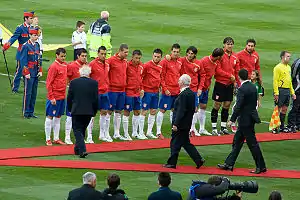
Kits, colours and badge
Nicknamed The Blues, the various Yugoslav teams of the 20th century wore a primarily blue kit. This was paired with white shorts and red socks, mimicking the blue-white-red tricolour flag. As Serbia and Montenegro continued this blue-white-red tradition, it was considered appropriate for a newly independent Serbian team to adopt a different colouring scheme.
Serbia eventually adopted red shirts, blue shorts and white socks, paralleling the primary red theme taken up by other national sports teams. Such a look was also based on a tricolour flag arrangement, albeit this time inspired by the flag of Serbia. The first home kit featured red shirts with a blue and white trim, whilst a cross motif was incorporated ahead of the 2010 World Cup. Taken from the country's coat of arms, it remained on the kits until 2014. In recent years, partly due to FIFA's increasingly strict kit clash regulations, Serbia have utilised all-red uniforms, abandoning blue altogether.
Serbia's away kits are traditionally white, featuring a red-and-blue trim.
The badge of the Football Association of Serbia is modelled on the escutcheon of the Serbian coat of arms. It features a modified version of the four firesteels, a historical Serbian emblem, with the addition of a football.
SFR Yugoslavia
1950–1962
|
1974
|
1982
|
1984
|
1990
|
1992
|
FR Yugoslavia / Serbia and Montenegro
|
1994
|
1998
|
2000
|
2004
|
2006
|
Serbia
|
2006–2008
|
2008–2010
|
2010–2012
|
2012–2014
|
2014–2016
|
2016–2018
|
2018–2020
|
2020–
|
Nicknames
Serbia is nicknamed 'the Eagles' (Orlovi / Орлови).[17] The name refers to the white double-headed eagle found on the coat of arms of Serbia, a national symbol of Serbia.
Kit sponsorship
In July 2014, a partnership was announced between the Football Association of Serbia and English manufacturer Umbro which is Serbia's official supplier before Puma took over with their home and away kits, debuting 7 September 2014 in the friendly match against France. On 7 September 2014, Serbia unveiled their latest kits also worn at the UEFA Euro 2016 qualifiers campaign.[18]
| Kit Supplier | Period |
| 2006–2014 | |
| 2014–2018 | |
| 2018–present |
Record in major tournaments
The Football Association of Serbia is deemed the direct successor to both SFR Yugoslavia and Serbia and Montenegro by FIFA, and therefore the inheritor to all the records of the defunct nations.
FIFA World Cup
FIFA World Cup qualification in temple
| FIFA World Cup record | Qualification record | |||||||||||||||||
|---|---|---|---|---|---|---|---|---|---|---|---|---|---|---|---|---|---|---|
| Year | Round | Position | Pld | W | D* | L | GF | GA | Pld | W | D | L | GF | GA | ||||
| within | ||||||||||||||||||
| Fourth place | 4th | 3 | 2 | 0 | 1 | 7 | 7 | Invited | ||||||||||
| Did not qualify | 2 | 0 | 1 | 1 | 3 | 4 | ||||||||||||
| 2 | 1 | 0 | 1 | 1 | 4 | |||||||||||||
| within | ||||||||||||||||||
| Group stage | 5th | 3 | 2 | 0 | 1 | 7 | 3 | 5 | 3 | 2 | 0 | 16 | 6 | |||||
| Quarter-finals | 7th | 3 | 1 | 1 | 1 | 2 | 3 | 4 | 4 | 0 | 0 | 4 | 0 | |||||
| Quarter-finals | 5th | 4 | 1 | 2 | 1 | 7 | 7 | 4 | 2 | 2 | 0 | 7 | 2 | |||||
| Fourth place | 4th | 6 | 3 | 0 | 3 | 10 | 7 | 4 | 3 | 1 | 0 | 11 | 4 | |||||
| Did not qualify | 6 | 3 | 1 | 2 | 10 | 8 | ||||||||||||
| 6 | 3 | 1 | 2 | 19 | 7 | |||||||||||||
| Second group stage | 7th | 6 | 1 | 2 | 3 | 12 | 7 | 5 | 3 | 2 | 0 | 8 | 4 | |||||
| Did not qualify | 4 | 1 | 0 | 3 | 6 | 8 | ||||||||||||
| Group stage | 16th | 3 | 1 | 1 | 1 | 2 | 2 | 8 | 6 | 1 | 1 | 22 | 7 | |||||
| Did not qualify | 8 | 3 | 2 | 3 | 7 | 8 | ||||||||||||
| Quarter-finals | 5th | 5 | 3 | 1 | 1 | 8 | 6 | 8 | 6 | 2 | 0 | 16 | 6 | |||||
| within | ||||||||||||||||||
| Suspended | Suspended | |||||||||||||||||
| Round of 16 | 10th | 4 | 2 | 1 | 1 | 5 | 4 | 12 | 9 | 2 | 1 | 41 | 8 | |||||
| Did not qualify | 10 | 5 | 4 | 1 | 22 | 8 | ||||||||||||
| within | ||||||||||||||||||
| Group stage | 32nd | 3 | 0 | 0 | 3 | 2 | 10 | 10 | 6 | 4 | 0 | 16 | 1 | |||||
| Group stage | 23rd | 3 | 1 | 0 | 2 | 2 | 3 | 10 | 7 | 1 | 2 | 22 | 8 | |||||
| Did not qualify | 10 | 4 | 2 | 4 | 18 | 11 | ||||||||||||
| Group stage | 23rd | 3 | 1 | 0 | 2 | 2 | 4 | 10 | 6 | 3 | 1 | 20 | 10 | |||||
| Future events | Future events | |||||||||||||||||
| Total | Fourth place | 12/21 | 46 | 18 | 8 | 20 | 66 | 63 | 128 | 75 | 31 | 22 | 269 | 114 | ||||
- * Draw for 1994 FIFA World Cup qualifiers was made on 8 December 1991, however due to break-up of Socialist Federal Republic of Yugoslavia and consequent military conflict, which broke in early 1991, FSJ ceased to exist as football organization of the SFR Yugoslavia. Organization that remained based in Belgrade, Serbia, was excluded from taking part as FSJ or its successor due to UN sanctions.[19]
| Serbia's World Cup record | |
|---|---|
| First Match | (Montevideo, Uruguay; 14 July 1930) |
| Biggest Win | (Gelsenkirchen, West Germany; 18 June 1974) |
| Biggest Defeat | (Gelsenkirchen, Germany; 16 June 2006) |
| Best Result | Fourth place in 1930 and 1962 |
| Worst Result | Group stage in 1950, 1982, 2006, 2010 and 2018 |
UEFA European Championship
UEFA European Championship qualifying in temple
| UEFA European Championship record | Qualification record | ||||||||||||||
|---|---|---|---|---|---|---|---|---|---|---|---|---|---|---|---|
| Year | Round | Position | Pld | W | D* | L | GF | GA | Pld | W | D | L | GF | GA | |
| as | |||||||||||||||
| Runners-up | 2nd | 2 | 1 | 0 | 1 | 6 | 6 | 4 | 2 | 1 | 1 | 9 | 4 | ||
| Did not qualify | 4 | 2 | 1 | 1 | 6 | 5 | |||||||||
| Runners-up | 2nd | 3 | 1 | 1 | 1 | 2 | 3 | 6 | 4 | 1 | 1 | 14 | 5 | ||
| Did not qualify | 8 | 3 | 4 | 1 | 7 | 5 | |||||||||
| Fourth Place | 4th | 2 | 0 | 0 | 2 | 4 | 7 | 8 | 6 | 1 | 1 | 15 | 5 | ||
| Did not qualify | 6 | 4 | 0 | 2 | 14 | 6 | |||||||||
| Group Stage | 8th | 3 | 0 | 0 | 3 | 2 | 10 | 6 | 3 | 2 | 1 | 12 | 11 | ||
| Did not qualify | 6 | 4 | 0 | 2 | 13 | 9 | |||||||||
| Qualified/Suspended | 8 | 7 | 0 | 1 | 24 | 4 | |||||||||
| as | |||||||||||||||
| Suspended | Suspended | ||||||||||||||
| Quarter-final | 8th | 4 | 1 | 1 | 2 | 8 | 13 | 8 | 5 | 2 | 1 | 18 | 8 | ||
| as | |||||||||||||||
| Did not qualify | 8 | 3 | 3 | 2 | 11 | 11 | |||||||||
| as | |||||||||||||||
| Did not qualify | 14 | 6 | 6 | 2 | 22 | 11 | |||||||||
| 10 | 4 | 3 | 3 | 13 | 12 | ||||||||||
| 8 | 2 | 1 | 5 | 8 | 13 | ||||||||||
| 10 | 5 | 3 | 2 | 20 | 19 | ||||||||||
| Future event | Future event | ||||||||||||||
| Total | Runners-up | 5/16 | 14 | 3 | 2 | 9 | 22 | 39 | 114 | 60 | 28 | 26 | 206 | 128 | |
| Serbia's European Championship record | |
|---|---|
| First Match | (Paris, France; 6 July 1960) |
| Biggest Win | (Paris, France; 6 July 1960) (Florence, Italy; 5 June 1968) (Liège, Belgium; 18 June 2000) |
| Biggest Defeat | (Lyon, France; 16 June 1984) (Rotterdam, Netherlands; 25 June 2000) |
| Best Result | Runners-up in 1960 and 1968 |
| Worst Result | Group stage in 1984 |
UEFA Nations League record
Last update : 18 November 2020
| UEFA Nations League record | ||||||||||
|---|---|---|---|---|---|---|---|---|---|---|
| Season | Division | Group | Pld | W | D | L | GF | GA | P/R | RK |
| C | 4 | 6 | 4 | 2 | 0 | 11 | 4 | 27th | ||
| B | 3 | 6 | 1 | 3 | 2 | 9 | 7 | 27th | ||
| B | Future event | |||||||||
| Total | 12 | 5 | 5 | 2 | 20 | 11 | 27th | |||
| Serbia's Nations League record | |
|---|---|
| First Match | (Vilnius, Lithuania; 7 September 2018) |
| Biggest Win | (Belgrade, Serbia; 18 November 2020) |
| Biggest Defeat | (Moscow, Russia; 3 September 2020) |
| Best Result | 27th place in 2018–19 and 2020–21 |
| Worst Result | |
Recent results and forthcoming fixtures
For more result see: Serbia national football team results
2020
| 3 September 2020 2020–21 UEFA Nations League B3 | Russia | 3–1 | | Moscow, Russia |
| 20:45 | Report |
|
Stadium: VTB Arena Attendance: 0 Referee: William Collum (Scotland) |
| 6 September 2020 2020–21 UEFA Nations League B3 | Serbia | 0–0 | | Belgrade, Serbia |
| 20:45 | Report | Stadium: Rajko Mitić Stadium Attendance: 0 Referee: Aleksei Kulbakov (Belarus) |
| 8 October 2020 UEFA Euro 2020 qualifying play-offs | Norway | 1–2 (a.e.t.) | | Oslo, Norway |
| 20:45 |
|
Report |
|
Stadium: Ullevaal Stadion Attendance: 200 Referee: Daniele Orsato (Italy) |
| 11 October 2020 2020–21 UEFA Nations League B3 | Serbia | 0–1 | | Belgrade, Serbia |
| 20:45 | Report |
|
Stadium: Rajko Mitić Stadium Attendance: 0 Referee: Sandro Schärer (Switzerland) |
| 14 October 2020 2020–21 UEFA Nations League B3 | Turkey | 2–2 | | Istanbul, Turkey |
| 20:45 |
|
Report |
|
Stadium: Türk Telekom Stadium Referee: Georgi Kabakov (Bulgaria) |
| 12 November 2020 UEFA Euro 2020 qualifying play-offs | Serbia | 1–1 (a.e.t.) (4–5 p) | | Belgrade, Serbia |
| 20:45 |
|
Report |
|
Stadium: Rajko Mitić Stadium Attendance: 0 Referee: Antonio Mateu Lahoz (Spain) |
| Penalties | ||||
| 15 November 2020 2020–21 UEFA Nations League B3 | Hungary | 1–1 | | Budapest, Hungary |
| 20:45 |
|
Report |
|
Stadium: Puskás Aréna Attendance: 0 Referee: Glenn Nyberg (Sweden) |
| 18 November 2020 2020–21 UEFA Nations League B3 | Serbia | 5–0 | | Belgrade, Serbia |
| 20:45 |
|
Report | Stadium: Rajko Mitić Stadium Attendance: 0 Referee: Anthony Taylor (England) |
2021
| 25 January 2021 International friendly | Dominican Republic | 0–0 | | Santo Domingo, Dominican Republic |
| 22:00 | Report | Stadium: Estadio Olímpico Félix Sánchez Attendance: 0 Referee: William Anderson (Puerto Rico) |
| 28 January 2021 International friendly | Panama | 0–0 | | Panama City, Panama |
| 01:00 | Report | Stadium: Estadio Rommel Fernández Attendance: 0 Referee: Ameth Ariel Sánchez Pinzón (Panama) |
| 24 March 2021 2022 FIFA World Cup qualification | Serbia | v | | Belgrade, Serbia |
| 20:45 | Stadium: Rajko Mitić Stadium |
| 27 March 2021 2022 FIFA World Cup qualification | Serbia | v | | Belgrade, Serbia |
| 20:45 | Stadium: Rajko Mitić Stadium |
| 30 March 2021 2022 FIFA World Cup qualification | Azerbaijan | v | | Baku, Azerbaijan |
| 18:00 | Stadium: Baku Olympic Stadium |
| 1 September 2021 International friendly | Qatar | v | | TBC |
| 4 September 2021 2022 FIFA World Cup qualification | Serbia | v | | Serbia |
| 18:00 |
| 7 September 2021 2022 FIFA World Cup qualification | Republic of Ireland | v | | Dublin, Ireland |
| 20:45 | Stadium: Aviva Stadium |
| 9 October 2021 2022 FIFA World Cup qualification | Luxembourg | v | | Luxembourg City, Luxembourg |
| 20:45 | Stadium: Stade de Luxembourg |
| 12 October 2021 2022 FIFA World Cup qualification | Serbia | v | | Serbia |
| 20:45 |
| 11 November 2021 International friendly | Serbia | v | | Serbia |
| 14 November 2021 2022 FIFA World Cup qualification | Portugal | v | | Portugal |
| 20:45 |
Head to head records (2006 onward)
- As of 28 January 2021
| Opponent | Pld | W | D | L | GF | GA | GD | Competitive matches[lower-alpha 1] |
|---|---|---|---|---|---|---|---|---|
| 2 | 1 | 0 | 1[lower-alpha 2] | 2 | 3 | –1 | 2016 EQ | |
| 1 | 1 | 0 | 0 | 3 | 0 | +3 | ||
| 5 | 3 | 2 | 0 | 8 | 1 | +7 | 2008 EQ 2016 EQ | |
| 2 | 0 | 1 | 1 | 1 | 2 | –1 | 2010 W | |
| 4 | 3 | 0 | 1 | 9 | 6 | +3 | 2010 WQ 2018 WQ | |
| 3 | 3 | 0 | 0 | 11 | 2 | +9 | 2008 EQ 2022 WQ | |
| 4 | 1 | 0 | 3 | 4 | 8 | –4 | 2008 EQ 2014 WQ | |
| 1 | 1 | 0 | 0 | 5 | 1 | +4 | ||
| 2 | 0 | 0 | 2 | 0 | 3 | –3 | 2018 W | |
| 2 | 2 | 0 | 0 | 7 | 1 | +6 | ||
| 1 | 1 | 0 | 0 | 4 | 3 | +1 | ||
| 2 | 1 | 0 | 1 | 3 | 2 | +1 | ||
| 1 | 1 | 0 | 0 | 2 | 0 | +2 | ||
| 1 | 0 | 0 | 1 | 0 | 1 | –1 | ||
| 1 | 1 | 0 | 0 | 1 | 0 | +1 | 2018 W | |
| 2 | 0 | 1 | 1 | 1 | 3 | –2 | 2014 WQ | |
| 4 | 3 | 1 | 0 | 7 | 2 | +5 | ||
| 2 | 1 | 0 | 1 | 4 | 5 | –1 | ||
| 2 | 0 | 0 | 2 | 1 | 5 | –4 | 2016 EQ | |
| 1 | 0 | 1 | 0 | 0 | 0 | 0 | ||
| 3 | 1 | 1 | 1 | 3 | 4 | –1 | 2012 EQ | |
| 4 | 4 | 0 | 0 | 10 | 1 | +9 | 2010 WQ 2012 EQ | |
| 2 | 1 | 1 | 0 | 2 | 0 | +2 | 2008 EQ | |
| 5 | 0 | 2 | 3 | 4 | 8 | –4 | 2010 WQ | |
| 2 | 2 | 0 | 0 | 4 | 1 | +3 | 2018 WQ | |
| 3 | 1 | 1 | 1 | 3 | 3 | 0 | 2010 W | |
| 1 | 0 | 0 | 1 | 0 | 1 | –1 | 2010 W | |
| 2 | 1 | 0 | 1 | 2 | 1 | +1 | ||
| 1 | 0 | 0 | 1 | 0 | 2 | –2 | ||
| 2 | 0 | 1 | 1 | 1 | 2 | –1 | 2020–21 NQ | |
| 2 | 2 | 0 | 0 | 5 | 1 | +4 | ||
| 2 | 0 | 1 | 1[lower-alpha 3] | 1 | 4 | –3 | 2012 EQ | |
| 1 | 1 | 0 | 0 | 2 | 1 | +1 | ||
| 2 | 2 | 0 | 0 | 5 | 0 | +5 | ||
| 2 | 1 | 0 | 1 | 2 | 2 | 0 | 2008 EQ | |
| 6 | 5 | 0 | 1 | 15 | 5 | +10 | 2010 WQ 2018–19 NQ 2020 EQ | |
| 2 | 2 | 0 | 0 | 6 | 3 | +3 | 2020 EQ 2022 WQ | |
| 1 | 0 | 0 | 1 | 1 | 2 | –1 | ||
| 2 | 2 | 0 | 0 | 6 | 0 | +6 | 2018 WQ | |
| 1 | 0 | 0 | 1 | 0 | 2 | –2 | ||
| 2 | 2 | 0 | 0 | 4 | 1 | +3 | 2018–19 NQ | |
| 1 | 1 | 0 | 0 | 2 | 0 | +2 | ||
| 3 | 1 | 1 | 1 | 6 | 3 | +3 | 2014 WQ | |
| 3 | 3 | 0 | 0 | 4 | 1 | +3 | 2012 EQ | |
| 2 | 1 | 1 | 0 | 3 | 2 | +1 | 2020 EQ | |
| 1 | 0 | 0 | 1 | 0 | 1 | –1 | ||
| 2 | 0 | 2 | 0 | 1 | 1 | 0 | ||
| 1 | 1 | 0 | 0 | 1 | 0 | +1 | ||
| 5 | 0 | 3 | 2 | 3 | 5 | –2 | 2008 EQ | |
| 6 | 0 | 3 | 3 | 7 | 11 | –4 | 2008 EQ 2016 EQ 2020 EQ 2022 WQ | |
| 1 | 0 | 0 | 1 | 0 | 3 | –3 | ||
| 5 | 2 | 3 | 0 | 6 | 4 | +2 | 2018 WQ 2022 WQ | |
| 4 | 2 | 2 | 0 | 10 | 4 | +6 | 2010 WQ 2018–19 NQ | |
| 6 | 1 | 2 | 3 | 9 | 8 | +1 | 2020–21 NQ | |
| 3 | 1 | 2 | 0 | 3 | 1 | +2 | 2014 WQ 2020 EQ | |
| 2 | 0 | 1 | 1 | 1 | 2 | –1 | 2012 EQ | |
| 1 | 1 | 0 | 0 | 3 | 1 | +2 | ||
| 3 | 1 | 1 | 1 | 3 | 3 | 0 | ||
| 1 | 0 | 0 | 1 | 0 | 2 | –2 | ||
| 2 | 1 | 0 | 1 | 3 | 2 | +1 | ||
| 1 | 0 | 0 | 1 | 1 | 2 | –1 | 2018 W | |
| 2 | 0 | 2 | 0 | 2 | 2 | 0 | 2020–21 NQ | |
| 5 | 0 | 1 | 4 | 2 | 12 | –10 | 2020 EQ | |
| 1 | 0 | 1 | 0 | 0 | 0 | 0 | ||
| 4 | 2 | 2 | 0 | 11 | 3 | +8 | 2014 WQ 2018 WQ | |
| Total (64) | 156 | 68 | 40 | 48 | 230 | 165 | +65 |
- Legend:
- "W" – FIFA World Cup match
- "E" – UEFA European Championship match
- "N" – UEFA Nations League Finals match
- "Q" – qualifying match or UEFA Nations League group stage match
- The Serbia v Albania match was abandoned with the score at 0–0 shortly before halftime after "various incidents", which resulted in the Albania players refusing to return to the field. UEFA ruled that Albania had forfeited the match and awarded a 3–0 win to Serbia, but also deducted three points from Serbia for their involvement in the events. Serbia must also play their next two home qualifying games behind closed doors, and both the Serbian and Albanian FAs were fined €100,000.[20] Both the Serbian and Albanian football associations were looking to have the decision revisited,[21][22] but the decision was upheld by UEFA.[23] Both associations then filed further appeals to the Court of Arbitration for Sport,[24] and on 10 July 2015 the Court of Arbitration for Sport rejected the appeal filed by the Serbian FA, and upheld in part the appeal filed by the Albanian FA, meaning the match is deemed to have been forfeited by Serbia with 0–3 and they are still deducted three points.[25] Serbian FA announced appeal at the Federal Supreme Court of Switzerland.[26]
- The Italy v Serbia match was abandoned after six minutes due to rioting by Serbian fans.[27] The UEFA Control and Disciplinary Body awarded the match as a 3–0 forfeit win to Italy.[28]
Head coaches
- As of 29 January 2021
| Manager | Period | Record | Major competitions | ||||||
|---|---|---|---|---|---|---|---|---|---|
| Matches | Won | Drawn | Lost | Win % | Draw % | Loss % | |||
| 2021 | 2 | 0 | 2 | 0 | 0 | 100.00 | 0 | — | |
| 2019–2020 | 14 | 6 | 5 | 3 | 42.86 | 35.71 | 21.43 | ||
| 2017–2019 | 19 | 9 | 5 | 5 | 47.36 | 26.32 | 26.32 | ||
| 2016–2017 | 15 | 8 | 5 | 2 | 53.33 | 33.33 | 13.33 | ||
| 2014–2016 | 11 | 5 | 0 | 6 | 45.45 | 0.00 | 55.55 | ||
| 2014 | 4 | 0 | 2 | 2 | 0.00 | 50.00 | 50.00 | ||
| 2014 | 4 | 2 | 1 | 1 | 50.00 | 25.00 | 25.00 | — | |
| 2012–2013 | 19 | 7 | 4 | 8 | 36.84 | 21.05 | 42.10 | ||
| 2011–2012 | 5 | 2 | 1 | 2 | 40.00 | 20.00 | 40.00 | — | |
| 2010–2011 | 13 | 5 | 3 | 5 | 38.46 | 23.08 | 38.46 | ||
| 2008–2010 | 28 | 17 | 3 | 8 | 60.71 | 10.71 | 28.57 | ||
| 2007–2008 | 5 | 0 | 2 | 3 | 0.00 | 40.00 | 60.00 | — | |
| 2006–2007 | 16 | 7 | 7 | 2 | 43.75 | 43.75 | 12.50 | ||
| 2003–2006 | 30 | 11 | 10 | 9 | 36.66 | 33.33 | 30.00 | ||
| 2001–2003 | 17 | 4 | 3 | 10 | 23.53 | 17.65 | 58.82 | ||
| 2001 | 8 | 4 | 2 | 2 | 50.00 | 25.00 | 25.00 | ||
| 2001 | 3 | 0 | 2 | 1 | 0.00 | 66.66 | 33.33 | ||
| 2000–2001 | 4 | 2 | 1 | 1 | 50.00 | 25.00 | 25.00 | — | |
| 1999–2000 | 15 | 6 | 5 | 4 | 40.00 | 33.33 | 26.66 | ||
| 1998–1999 | 6 | 3 | 2 | 1 | 50.00 | 33.33 | 16.66 | — | |
| 1994–1998 | 43 | 26 | 10 | 7 | 60.46 | 23.25 | 16.28 | ||
| TOTAL | 281 | 124 | 75 | 82 | 44.13 | 26.69 | 29.18 | 5 out of 12 | |
For the period before 1992 see: Yugoslavia national football team#Head coaches
Current coaching staff
- As of 14 January 2021
|
Players
Current squad
The following players were called up for the International friendly games against ![]() Dominican Republic on 25 January and against
Dominican Republic on 25 January and against ![]() Panama on 28 January 2021.[29]
Panama on 28 January 2021.[29]
Caps and goals updated as of 29 January 2021 after the game against Panama.
Recent call-ups
The following players have been called up for the team in the last twelve months.
| Pos. | Player | Date of birth (age) | Caps | Goals | Club | Latest call-up |
|---|---|---|---|---|---|---|
| GK | Predrag Rajković | 31 October 1995 | 18 | 0 | v. | |
| GK | Đorđe Nikolić | 13 May 1997 | 0 | 0 | v. | |
| GK | Marko Dmitrović | 24 January 1992 | 16 | 0 | v. | |
| GK | Emil Rockov | 27 January 1995 | 1 | 0 | v. | |
| DF | Mihajlo Ivančević | 7 April 1999 | 0 | 0 | v. | |
| DF | Nikola Milenković | 12 October 1997 | 26 | 1 | v. | |
| DF | Stefan Mitrović | 22 May 1990 | 21 | 0 | v. | |
| DF | Filip Mladenović | 15 August 1991 | 15 | 1 | v. | |
| DF | Uroš Spajić | 13 February 1993 | 14 | 0 | v. | |
| DF | Strahinja Pavlović | 24 May 2001 | 4 | 0 | v. | |
| DF | Nikola Maraš | 19 December 1995 | 2 | 0 | v. | |
| DF | Aleksandar Kolarov (captain) | 10 November 1985 | 94 | 11 | v. | |
| DF | Miloš Veljković | 26 September 1995 | 9 | 0 | v. | |
| DF | Nikola Maksimović | 25 November 1991 | 25 | 0 | v. | |
| MF | Dušan Tadić (Vice captain) | 20 November 1988 | 73 | 16 | v. | |
| MF | Nemanja Gudelj | 16 November 1991 | 33 | 1 | v. | |
| MF | Nemanja Maksimović | 26 January 1995 | 26 | 0 | v. | |
| MF | Mijat Gaćinović | 8 February 1995 | 23 | 2 | v. | |
| MF | Nemanja Radonjić | 15 February 1996 | 20 | 4 | v. | |
| MF | Sergej Milinković-Savić | 27 February 1995 | 20 | 3 | v. | |
| MF | Saša Lukić | 13 August 1996 | 17 | 0 | v. | |
| MF | Darko Lazović | 15 September 1990 | 15 | 0 | v. | |
| MF | Marko Grujić | 13 April 1996 | 9 | 0 | v. | |
| MF | Mihailo Ristić | 31 October 1995 | 5 | 0 | v. | |
| MF | Saša Zdjelar | 20 March 1995 | 3 | 0 | v. | |
| MF | Lazar Ranđelović | 5 August 1997 | 1 | 0 | v. | |
| MF | Filip Kostić | 1 November 1992 | 35 | 2 | v. | |
| MF | Aleksandar Katai | 6 February 1991 | 10 | 0 | v. | |
| MF | Luka Milivojević | 7 April 1991 | 38 | 1 | v. | |
| MF | Filip Đuričić | 30 January 1992 | 29 | 4 | v. | |
| MF | Adem Ljajić | 29 September 1991 | 47 | 9 | v. | |
| MF | Nemanja Matić | 1 August 1988 | 48 | 2 | v. | |
| FW | Filip Stevanović | 25 September 2002 | 0 | 0 | v. | |
| FW | Aleksandar Mitrović | 16 September 1994 | 61 | 36 | v. | |
| FW | Luka Jović | 23 December 1997 | 11 | 5 | v. | |
| FW | Dušan Vlahović | 28 January 2000 | 4 | 1 | v. | |
| FW | Đorđe Despotović | 4 March 1992 | 0 | 0 | v. | |
| FW | Danijel Aleksić | 30 April 1991 | 2 | 0 | v. | |
Notes:
- PRE Preliminary squad
- SUS Player suspended
- INJ Player withdrew from the roster due to an injury
- COV Player withdrew from the roster due to COVID-19
- RET Retired from the national team
- WD Player withdrew from the roster for non-injury related reasons
Previous squads
Player statistics
.jpg.webp)
Most capped players
- As of 15 November 2020 [30]
| # | Player | Pos. | Period | Caps | Goals |
|---|---|---|---|---|---|
| 1 | Branislav Ivanović | DF | 2005–2018 | 105 | 13 |
| 2 | Dejan Stanković | MF | 1998–2013 | 103 | 15 |
| 3 | Savo Milošević | FW | 1994–2008 | 102 | 37 |
| 4 | Aleksandar Kolarov | DF | 2008– | 94 | 11 |
| 5 | Dragan Džajić | MF | 1964–1979 | 85 | 23 |
| 6 | Dragan Stojković | MF | 1983–2001 | 84 | 15 |
| Vladimir Stojković | GK | 2006–2018 | 84 | 0 | |
| 8 | Zoran Tošić | MF | 2007–2016 | 76 | 11 |
| 9 | Predrag Mijatović | FW | 1989–2003 | 73 | 27 |
| Dušan Tadić | MF | 2008– | 73 | 16 | |
Top goalscorers
- As of 18 November 2020[31]
| # | Player | Period | Goals | Caps | Average |
|---|---|---|---|---|---|
| 1 | Stjepan Bobek | 1946–1956 | 38 | 63 | 0.60 |
| 2 | Savo Milošević | 1994–2008 | 37 | 102 | 0.36 |
| Blagoje Marjanović | 1926–1938 | 37 | 58 | 0.64 | |
| Milan Galić | 1959–1965 | 37 | 51 | 0.72 | |
| 5 | Aleksandar Mitrović | 2013– | 36 | 61 | 0.59 |
| 6 | Rajko Mitić | 1946–1957 | 32 | 59 | 0.54 |
| 7 | Dušan Bajević | 1970–1977 | 29 | 37 | 0.78 |
| 8 | Todor Veselinović | 1953–1961 | 28 | 37 | 0.76 |
| 9 | Predrag Mijatović | 1989–2003 | 27 | 73 | 0.37 |
| 10 | Borivoje Kostić | 1956–1964 | 26 | 33 | 0.79 |
Captains (after 1994)
| Name | Period | Major tournaments as the captain |
|---|---|---|
| Dragan Stojković | 1994–2001 | 1998 FIFA World Cup, UEFA Euro 2000 |
| Savo Milošević | 2001–2006 | 2006 FIFA World Cup |
| Dejan Stanković | 2006–2011 | 2010 FIFA World Cup |
| Nikola Žigić | 2011 | — |
| Branislav Ivanović | 2012–2018 | — |
| Aleksandar Kolarov | 2018– | 2018 FIFA World Cup |
Notable players
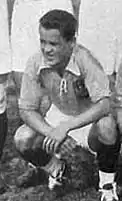 Aleksandar Tirnanić played in the 1930 World Cup and managed the team from 1953 to 1960
Aleksandar Tirnanić played in the 1930 World Cup and managed the team from 1953 to 1960.jpg.webp) Rajko Mitić played for Yugoslavia between 1946 and 1957
Rajko Mitić played for Yugoslavia between 1946 and 1957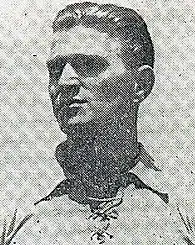 Stjepan Bobek is the top goalscorer in the team's history with 38 goals
Stjepan Bobek is the top goalscorer in the team's history with 38 goals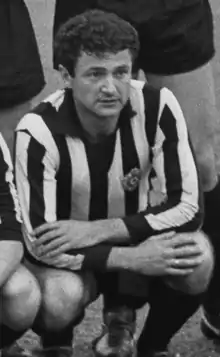 Milan Galić played 51 match and scored 37 goals for the team
Milan Galić played 51 match and scored 37 goals for the team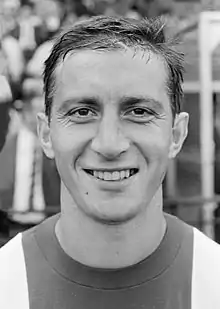 Velibor Vasović, defender played for Yugoslavia between 1961 and 1966
Velibor Vasović, defender played for Yugoslavia between 1961 and 1966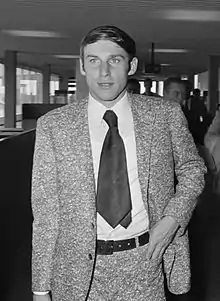 Dragan Džajić was considered by many to be the best player in history of Yugoslavia
Dragan Džajić was considered by many to be the best player in history of Yugoslavia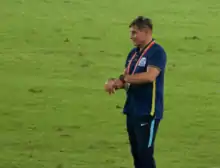 Dragan Stojković, played 18 years for the national team
Dragan Stojković, played 18 years for the national team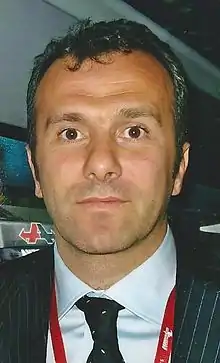 Dejan Savićević played for the team from 1986 to 1999 and managed the team from 2001 to 2003
Dejan Savićević played for the team from 1986 to 1999 and managed the team from 2001 to 2003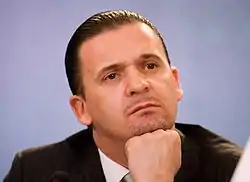 Predrag Mijatović was a goalscorer in 1998 World Cup qualifiers with 13 goals
Predrag Mijatović was a goalscorer in 1998 World Cup qualifiers with 13 goals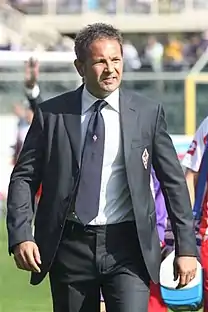 Siniša Mihajlović played 63 matches for the team from 1993 to 2003 and managed team in 2014 FIFA World Cup qualification
Siniša Mihajlović played 63 matches for the team from 1993 to 2003 and managed team in 2014 FIFA World Cup qualification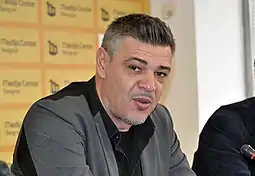 Savo Milošević played 102 matches, scored 37 goals and was UEFA Euro 2000 Golden Boot
Savo Milošević played 102 matches, scored 37 goals and was UEFA Euro 2000 Golden Boot Darko Kovačević played 59 matches and scored 10 goals from 1994 to 2004
Darko Kovačević played 59 matches and scored 10 goals from 1994 to 2004.jpg.webp) Dejan Stanković is Serbian player who won the most trophies. Played in three World Cups and one European Championship
Dejan Stanković is Serbian player who won the most trophies. Played in three World Cups and one European Championship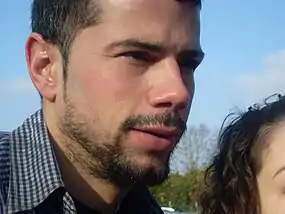 Mateja Kežman was top goal scorer for the team in 2006 FIFA World Cup qualification
Mateja Kežman was top goal scorer for the team in 2006 FIFA World Cup qualification.jpg.webp) Nemanja Vidić played 56 matches, and was participant in two World Cups
Nemanja Vidić played 56 matches, and was participant in two World Cups.jpg.webp) Branislav Ivanović is the former captain, and also the most capped player in the team's history
Branislav Ivanović is the former captain, and also the most capped player in the team's history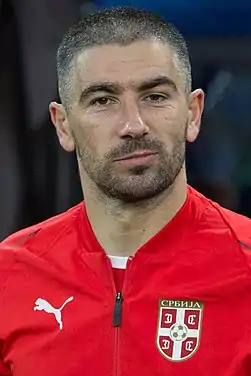 Aleksandar Kolarov is the current captain of the team
Aleksandar Kolarov is the current captain of the team.jpg.webp) Vladimir Stojković is the most capped goalkeeper in the team's history
Vladimir Stojković is the most capped goalkeeper in the team's history.jpg.webp) Nemanja Matić, defensive midfielder, played for the team from 2008 to 2019
Nemanja Matić, defensive midfielder, played for the team from 2008 to 2019.jpg.webp) Dušan Tadić, creative play-maker
Dušan Tadić, creative play-maker.jpg.webp) Aleksandar Mitrović, center forward
Aleksandar Mitrović, center forward
See also
- Serbia national football team results
- Serbia national under-23 football team
- Serbia national under-21 football team
- Serbia national under-20 football team
- Serbia national under-19 football team
- Serbia national under-17 football team
- List of Serbia international footballers (including predecessor teams)
- Yugoslavia national football team
References
- "The FIFA/Coca-Cola World Ranking". FIFA. 10 December 2020. Retrieved 10 December 2020.
- History Archived 27 December 2011 at the Wayback Machine at FSS official website, Retrieved 4 October 2012 (in Serbian)
- Serbia at FIFA official website
- News: Serbia at UEFA official website, published 1 January 2011, Retrieved 4 October 2012
- "Serbia's first match". reprezentacija.rs. Retrieved 5 December 2017.
- Vecsey, George (26 June 1998). "Sports of The Times; Scrapbooks Of History For the U.S". The New York Times. Archived from the original on 16 July 2012.
- http://www.arhiva.serbia.gov.rs/news/1999-08/19/13984.html
- "Leading goalscorers". UEFA.com. Union of European Football Associations. 2 July 2000. Archived from the original on 11 July 2000. Retrieved 12 July 2012.
- ESPN Soccernet: Germany 0–1 Serbia 18 June 2010
- Bleacher Report: FIFA World Cup 2010: Dejan Stankovic's Strange Record 15 June 2010. By Jon Sainz
- YouTube – FIFATV: 'Most famous day in Serbia's footballing history' Published 20 May 2012
- "Football's 10 Greatest International Rivalries". Goal.com. 17 November 2010.
- "Archived copy". Archived from the original on 7 January 2016. Retrieved 15 October 2014.CS1 maint: archived copy as title (link)
- "FIFA Tournaments - Compare Teams". FIFA.com. FIFA. Retrieved 27 August 2016.
- "Kako je plavi dres - pocrveneo". 9 April 2012.
- "Kako je plavi dres pocrveneo". Retrieved 22 November 2017.
- Dnevni sportski list "Sport", #17.485–17.486, Belgrade, 17–18 August 2006: "Srbija je ostvarila rezultat kakav verovatno niko nije mogao da sanja. Bila je to divna fudbalska noc, prvi let i pobeda naših "orlova".
- Serbia set to sign new kit deal with Umbro? Football-shirts.co.uk 6 March 2014
- "History of the FIFA World Cup Preliminary Competition (by year)" (PDF). FIFA.com. Fédération Internationale de Football Association. Retrieved 13 December 2011.
- "Serbia and Albania disciplinary decision". UEFA. Retrieved 24 October 2014.
- AFP (25 October 2014). "Albania to appeal UEFA punishment over Serbia fracas". Business Insider. Retrieved 26 October 2014.
- "Serbia to appeal Uefa decision". Goal.com. 24 October 2014.
- "Decisions upheld for Serbia-Albania match". UEFA.com. 2 December 2014.
- "The football associations of Albania and Serbia file appeals at the Court of Arbitration for Sport (CAS)" (PDF). tas-cas.org. Court of Arbitration for Sport. Retrieved 8 January 2015.
- "FOOTBALL: The CAS rejects the appeal filed by the Serbian FA, upholds in part the appeal filed by the Albanian FA: the match Serbia-Albania is deemed to have been forfeited by Serbia (0–3)". Tribunal Arbitral du Sport / Court of Arbitration for Sport. 10 July 2015. Retrieved 10 July 2015.
- "Fudbalski savez Srbije – zvanična web prezentacija". fss.rs.
- Italy-Serbia match abandoned due to crowd trouble
- UEFA statement on Italy-Serbia case Archived 1 January 2011 at the Wayback Machine
- "ИЛИЈА СТОЛИЦА ПОЗВАО 25 ИГРАЧА ЗА УТАКМИЦЕ ПРОТИВ ДОМИНИКАНСКЕ РЕПУБЛИКЕ И САД" (in Serbian). 13 January 2021.
- "Most matches for Serbia football team". reprezentacija.rs. Retrieved 3 October 2017.
- "Most goals for Serbia football team". reprezentacija.rs. Retrieved 3 October 2017.
External links
| Wikimedia Commons has media related to Serbia national football team. |
- Official
- Football Association of Serbia – official site (in Serbian)
- FIFA profile
- Serbian National Football Team (in Serbian)
- UEFA team profile
- FIFA team profile
- Unofficial
